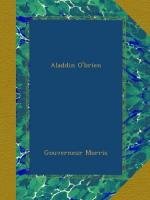Very soon after the explosion of the wonderful lamp the Widow Brackett had taken Aladdin and Jack and the cat into her house and seen to it that they had a square meal. Early on the second day she came to the conclusion that if it could in any way be made worth her while, she would like to keep them until they grew up. And when the ground upon which Aladdin’s father’s house had stood was sold at auction for three hundred and eight dollars, she let it be known that if she could get that she would board the two little waifs until Aladdin was old enough to work. The court appointed two guardians. The guardians consulted for a few minutes over something brown in a glass, and promptly turned over the three hundred and eight dollars to the Widow Brackett; and the Widow Brackett almost as promptly made a few alterations in the up-stairs of her house the better to accommodate the orphans, tied a dirty white ribbon about the yellow cat’s neck, and bought a derelict piano upon which her heart had been set for many months. She was no musician, but she loved a tightly closed piano with a scarf draped over the top, and thought that no parlor should be without one. Up to middle C, as Aladdin in time found out, the piano in question was not without musical pretensions, but above that any chord sounded like a nest of tin plates dropped on a wooden floor, and the intervals were those of no known scale nor fragment thereof. But in time he learned to draw pleasant things from the old piano and to accompany his shrill voice in song. As a matter of fact, he had no voice and never would have, but almost from the first he knew how to sing. It so happened that he was drawn to the piano by a singular thing: a note from his beloved.




